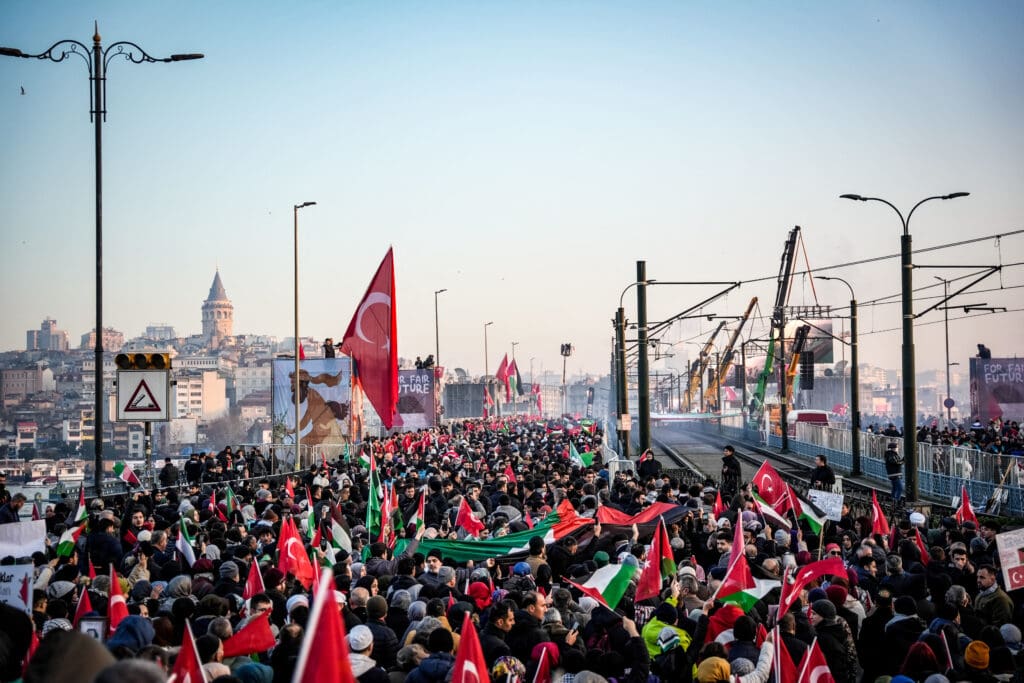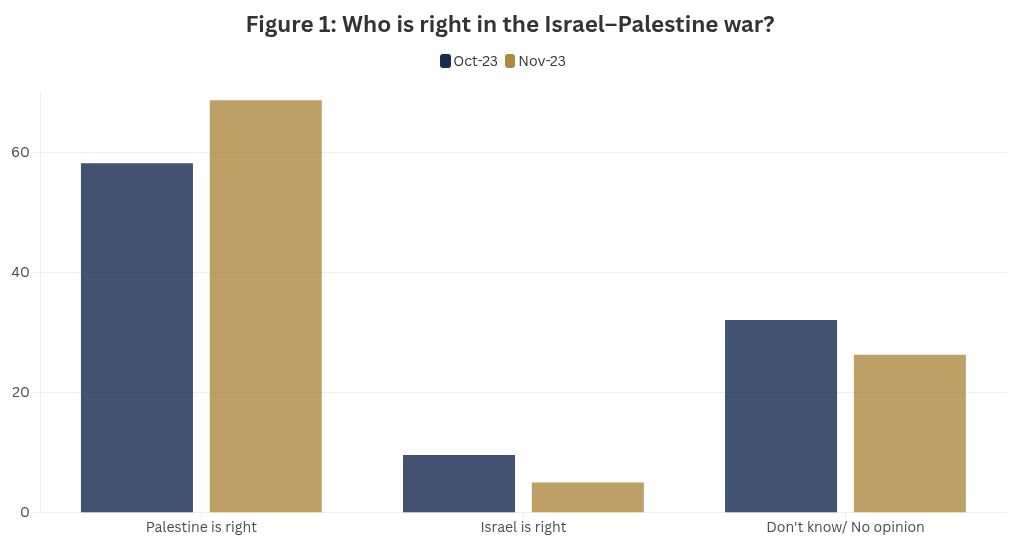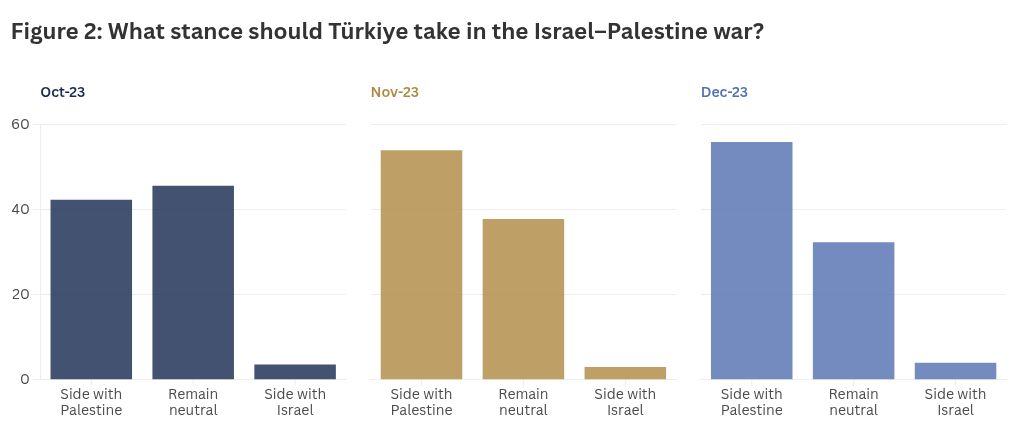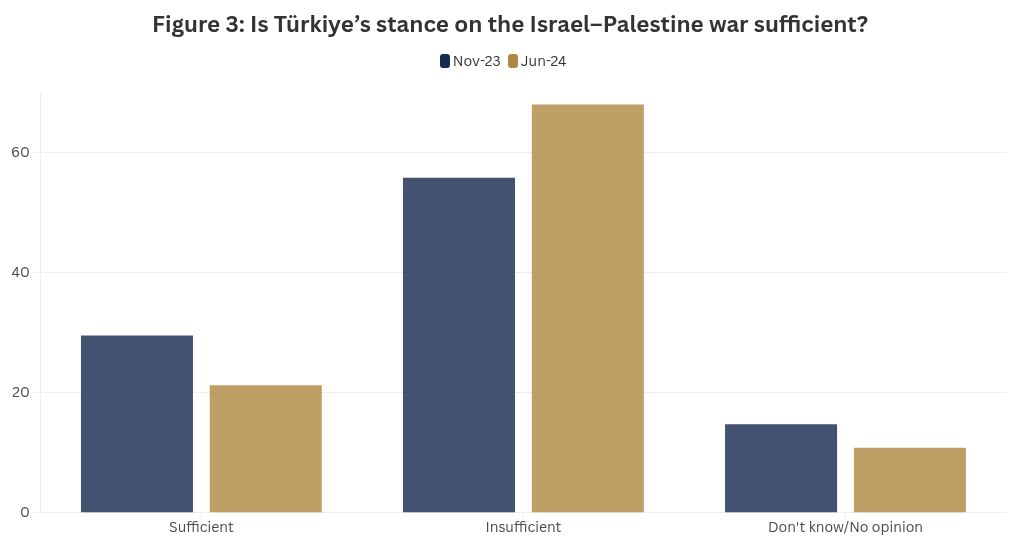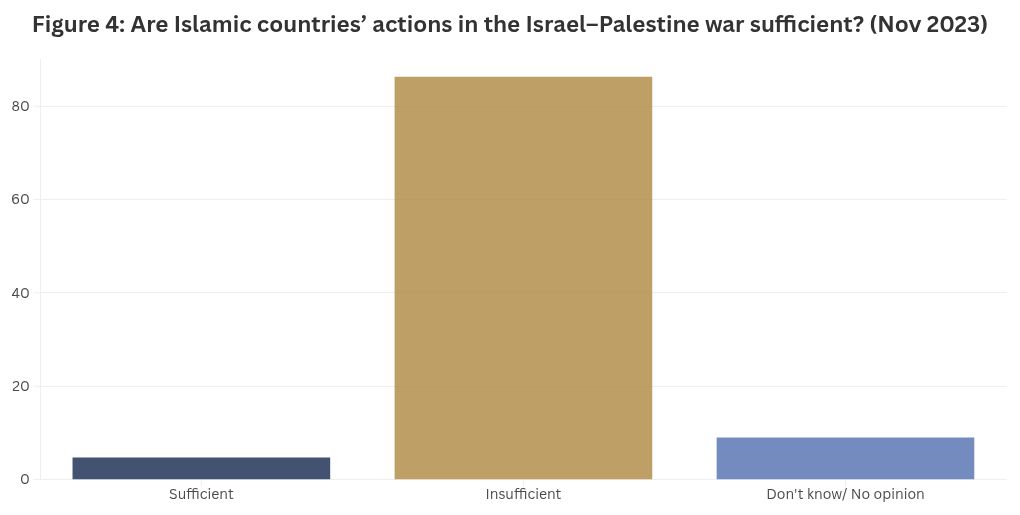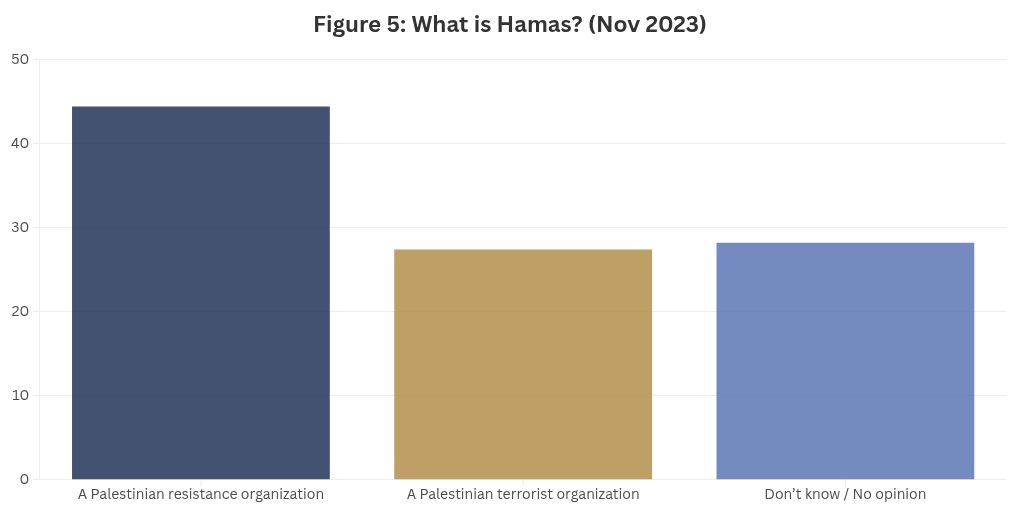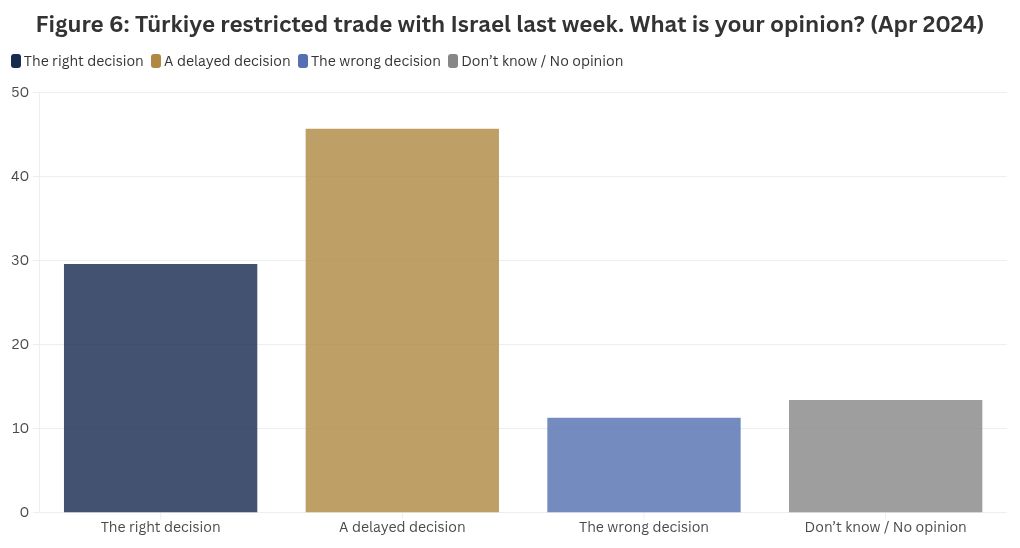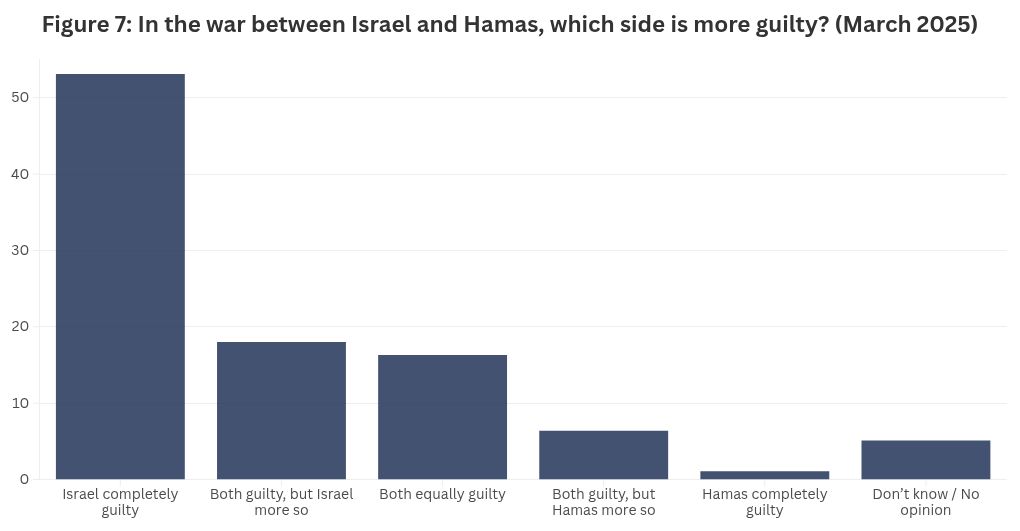This analysis paper examines how young people in Türkiye, who are digitally connected, understand Israel’s war on Gaza. It explores the relationship between their interpretations and their political beliefs, as well as their views on international politics and Türkiye’s foreign policy. This study analyzes nine focus groups (n=51) from various cohorts, including religious-conservative, secular, nationalist, Kurdish, and leftist groups. It is supported by nationwide youth surveys conducted from October to December 2023, April to June 2024, and March 2025. The findings indicate a shift in perception from initial ambivalence following October 7th, 2023, to a widespread pro-Palestinian moral consensus and significant global criticism. Gaza serves as a standard for evaluating the reliability and consistency of global actors, including both Western and non-Western countries, as well as Arab/Muslim states and Türkiye. Various groups apply distinct perspectives—such as religious faith, humanitarian law, national sovereignty, statelessness, and structural critiques—yet they evaluate actors based on the same standards: justice, consistency, accountability, and credible constraints on the use of force. Western double standards are frequently cited as problematic across various cohorts, even by those who appreciate Western norms and institutions. Russia and China are primarily viewed as counterweights rather than models, making multipolarity a tactical decision instead of a normative one. Domestically, pro-Palestinian rhetoric alone is insufficient; trade, sanctions, and the mediation outcomes and performance are used to assess Ankara’s sincerity. The Gaza war influences young people’s views on foreign policy in Türkiye, leading to a greater demand for alignment between values, policy tools, and outcomes.
After nearly two years of fighting, Israel’s war on Gaza has crystallized into a key moral and political issue for young people around the world—not least in Türkiye. Since Hamas attacked Israel on October 7, 2023, Israel has waged a sustained military campaign on the territory. By September 2025, it has killed more than 66,000 and injured over 168,000 Palestinians, the vast majority civilians.1 Israel’s targeting of humanitarian aid distribution points has been claiming more lives, underscoring how it has weaponized famine and violence as instruments of war. For Türkiye’s youth, this is not an abstract humanitarian tragedy, but rather an existential moral question through which they assess justice, power, and legitimacy. Gaza has served simultaneously as a prism of global injustice and as a catalyst compelling young citizens to question the global order and their own government’s credibility and coherence.
Today, young people are embedded in a highly networked digital environment. Social media platforms are not passive channels, but curated political ecosystems where outrage, solidarity, and critique are actively produced and circulated. In this digitally mediated sphere, Gaza emerges as a litmus test of governance, ethics, and political alignment, both internationally and within Türkiye.
This analysis paper, informed primarily by nine focus groups and complemented by survey data between 2023-2025, explores how Türkiye’s youth interpret the war on Gaza, the frames they deploy, the solutions they propose, and how their narratives signal broader shifts in Türkiye’s alignment and foreign policy.
Methodology
This study relies first and foremost on qualitative focus group research, supported by survey findings to add context. The surveys help chart broad generational trajectories in views on Gaza War, while the focus groups provide depth, texture, and the lived vocabularies of solidarity, disillusionment, and critique that underpin these quantitative patterns.
Focus Groups
Between June and August 2024, nine focus groups were convened with 51 participants (17 female, 34 male) aged 18–27. Of these, 37 were university students and 14 were employed either part- or full-time. While 36 participants were from Istanbul, others represented Ankara, Diyarbakır, Erzurum, Şanlıurfa, Edirne, Kocaeli, Kahramanmaraş, and Afyon—reflecting both metropolitan and provincial viewpoints. Participants self-identified across five ideological camps: religious/conservative, secular, nationalist, Kurdish, and socialist/leftist.
The discussions revealed how ideological frames shape young people’s understandings of the conflict in Gaza, highlighting both distinct perspectives and shared frustrations.
Surveys
The focus group findings are complemented by three waves of survey date from Türkiye: two PANORAMATR monthly nationwide surveys, conducted in October 2023, November 2023, December 2023 and April 2024, and a third survey conducted under “Understanding the Youth in Turkey: Democracy and Political Values” project carried out by CORE Research Institute in March 2025.2
Trajectories in Survey Data: From Ambiguity to Moral Clarity
Shock and Uncertainty
(October 2023)
In the immediate aftermath of the October 7 attacks, youth opinion was fragmented. While 42.3% believed Türkiye should side with the Palestinians, slightly more—45.6%—preferred neutrality. When asked who was right in the conflict, 58.2% supported the Palestinians, 9.6% Israel, and a striking 32.1% remained undecided. These figures reflect the disorientation of the war’s early days, when images of violence circulated rapidly but narratives had not yet solidified. For many, October was marked primarily by shock.
Consolidation of Solidarity
(November 2023)
By November, opinions had shifted sharply toward the Palestinians, with 54.0% saying Türkiye should support the Palestinians, while those declaring neutrality dropped to 37.8%. Over two-thirds, 68.7%, judged the Palestinians as being in the right, compared with only 5.0% for Israel. Beyond this, many young people expressed frustration with global and regional actors: 86.3% saw Islamic countries’ responses as insufficient, and a majority of 55.8% judged Türkiye’s own stance inadequate. Meanwhile, views of Hamas began to normalize the framework of resistance: 44.4% called it a resistance organization, compared to 27.4% who saw it as a terrorist group.
Entrenchment of Views
(December 2023)
By the year’s end, this trend had stabilized, with 55.9% favoring Türkiye siding with Palestine, while neutrality had declined further to 32.3%. Support for Israel remained minimal, at just 3.9%. The numbers suggest that the initial ambiguity of October had fully given way to an entrenched, pro-Palestinian majority among young people.
Trade as a Litmus Test
(April 2024)
When Türkiye restricted trade with Israel in April 2024, Türkiye’s youth overwhelmingly endorsed the move: 29.6% said it was the right decision, and another 45.7% said it was long overdue. Only 11.3% judged it as wrong.
Disillusionment Despite Action
(June 2024)
Yet this optimism quickly faded. By June 2024, youth evaluations of Türkiye’s overall stance had declined. The share describing the government’s response as “sufficient” had fallen from 29.5% in November 2023 to 21.2%, while those calling it “insufficient” rose sharply from 55.8% to 68.0%. Even after Türkiye’s economic measures, skepticism was growing among its youth, for whom Ankara’s stance was too little, too late.
Moral Asymmetry and Clarity
(March 2025)
A latest survey in March 2025, youth opinion had crystallized into near-consensus: 53.1% said Israel was completely guilty, and another 18.0% said that both sides were guilty—but Israel more so. Only 1.1% said Hamas was completely guilty. 7.5% placed greater blame on Hamas, while 16.3% said both were equally guilty. These results underscore how deeply Gaza functions as a moral benchmark for Turkish youth: Israel is perceived as the clear aggressor, while Hamas, though not uncritically supported, is rarely blamed in isolation.
Mapping a Generation’s Mindset through Focus Groups
From October 2023 to March 2025, public surveys traced a clear trajectory: what began as uncertainty quickly hardened into moral clarity. An initial hint of ambivalence gave way to a broad perception that Israel was committing disproportionate atrocities.
While these numbers reveal much about trends in opinion, focus group discussions reveal what these data alone cannot: the different ideological frames through which young people interpret the war in Gaza. Religious, secular, nationalist, Kurdish, and leftist youth offer distinct vocabularies of solidarity, critique, frustration, and solutions. Taken together, their perspectives form a complex spectrum that goes beyond mere binaries of support or opposition, revealing both fractures and convergences in a generation’s political consciousness
Faith, Honor, and the Moral Imperative
(Religious/Conservative Youth)
For participants in the focus groups with religiously conservative views, the war on Gaza is a direct affront to the dignity of the global Islamic community (ummah). Palestine was framed not just as a territory but as a spiritual symbol, with Jerusalem (Kudüs) repeatedly cited as a sacred geography tied to both faith and identity. This group viewed the conflict as an attack on the global Muslim community. As one participant noted, “Palestine is not just an issue of land for us, it embodies a matter of faith and honor.
Participants were skeptical and idealistic about conflict resolution. Some advocated unyielding resistance, while others advocated peace based on international law and Muslim solidarity. Their views on conflict resolution were divided. A faction of the group views Israel as illegitimate and a symbol of occupation and calls for its demolition. Some religious advocated diplomacy, citing international law rather than uncompromising animosity. Even while they defend Hamas against decades of Israeli aggression, many criticize its tactics, especially when civilians are killed. Some participants call the October 7th incident “historically necessary,” while others doubt its political goal and worry that it may have sparked a disproportionate Israeli response.
Legal Reasoning, Ethical Tensions
(Secular Youth)
Young secular participants framed the Gaza conflict through a humanitarian and legal lens, rather than through religious solidarity. Their discussions centered on civilian suffering, violations of international law, and the erosion of human rights norms. They frequently pointed to Western hypocrisy and the double standards of the United States and European countries.
One participant reflected the group’s nuanced view: “Hamas’s actions are unacceptable from a human rights perspective, but these actions stem from desperation. The Palestinian people have been left with no other option.” This reveals a tension between legal principles and moral outrage.
This group also drew a distinction between Israeli state policies and Jewish identity. They reflected on the historical predicament of Jews, acknowledging that past persecution has shaped their identity. This acknowledgment, however, coexists with a simultaneous critique of contemporary Israeli actions, which they argue have exacerbated the conflict. When it comes to Hamas, mixed feelings were expressed: on the one hand, they see the group as a necessary actor born out of desperation, but on the other hand, they denounce its tactics when they lead to further violence. Participants widely supported a two-state solution but were skeptical of international actors—including their own government—in promoting it. They expressed discomfort with Türkiye’s use of religious rhetoric, arguing it masked inconsistencies like ongoing trade with Israel.
Strategic Realism and National Sovereignty
(Nationalist Youth)
Participants with nationalist views framed the conflict is part of a continuum of territorial and cultural dislocations that have plagued the Muslim world since the fall of the Ottoman Empire. They perceive Israel’s presence in former Ottoman lands as a lingering consequence of Western imperialism, with many attributing significant responsibility to the longstanding U.S.-Israel alliance.
Nationalists are careful to distinguish between differing Jewish identities, recognizing that even within Israel there exist voices opposed to the government’s hardline stance. Jerusalem remains a potent symbol for this group, seen not merely as a city but as a rallying point for reclaiming lost heritage and identity. For this group, Palestine was a site of historical responsibility and regional legacy.
Discussions combined emotional solidarity with pragmatic caution. In terms of conflict resolution, nationalist youth advocated for third-party mediation. They repeatedly voiced the idea that Türkiye should play a leading mediation role and expressed frustration that the government’s rhetoric did not always translate into meaningful action. Their criticism of continued trade with Israel was often balanced by geopolitical realism, favoring calculated leverage over isolationism.
This group saw the region as “our geography”, evoking a sense of post-imperial stewardship. Unlike the other groups, they framed the inaction of other Arab states through a lens of regional competition, expressing the belief that Türkiye could and should fill the leadership vacuum. They largely agreed that Türkiye should adopt a sovereign, morally coherent, but realist posture.
Statelessness, Recognition, and Inclusive Justice
(Kurdish Youth)
Kurdish youth interpreted the conflict through the prism of statelessness, marginalization, and the denial of collective rights. They drew explicit parallels between the Palestinian struggle and their own experiences, finding a sense of shared dispossession and political affinity. One participant captured this sentiment: “The struggle for justice in Palestine is not so different from our own struggle. It is a call for humanity to recognize the rights of those who have been excluded.”
They strongly emphasized the right to self-determination and the failure of regional powers to engage with oppressed populations. They were critical of Israel’s actions, but also pointed to Türkiye’s domestic inconsistencies, noting its support for Palestinian rights abroad while failing to fully recognize Kurdish representative rights at home. While acknowledging the legitimacy of Palestinian resistance, they questioned the long-term effectiveness of the tactics of Hamas, often viewing them as symptoms of global abandonment.
This group rejected top-down deals brokered by regional powers, instead advocating for multilateral, inclusive, and rights-based mediation frameworks for external involvement. They believed any resolution must address long-standing structural inequalities for Palestinians and other stateless peoples.
Structural Violence and Anti-Imperial Solidarity
(Socialist/Leftist Youth)
For young participants in focus group with leftist and socialist views, the Gaza war was a symptom of global systems of oppression. They invoked capitalism, imperialism, and militarism as the structural forces driving this conflict. One participant argued that: “This war is as much about territory as it is a mechanism that capitalism relies on to sustain itself. Where capitalism exists, war becomes inevitable.”
They discussed Hamas with ambivalence, rejecting the “terrorist” label and instead describing it as a product of decades of occupation. They argued that focusing solely on Hamas distracts from the underlying political economy of the conflict. Their critique extended equally to regional powers and global institutions, which they saw as complicit through their inaction.
Rather than proposing immediate traditional diplomatic solutions, this group focused on longer-term systemic transformation, connecting Palestinian liberation to broader struggles for collective emancipation. There was little disagreement on their core structural critiques, as they consistently emphasized that no meaningful peace is possible without dismantling the global systems that sustain conflict and inequality.
Table 1: Dominant Framings of the Conflict, by Group
Religious
Secular
Nationalist
Kurdish
Leftist
Theological: Faith, the Islamic Ummah, Theological Lens, Sacred Symbol, Islamic Values, Jerusalem’s Significance
x
Historical: Historical Lens, Ottoman Empire, Historical Consciousness, Territorial Loss, Promised Land
x
x
Resistance: Hamas, Resistance Movement, Palestinian Resistance
x
x
Self-Determination: Autonomy, Rights, Stateless Groups
x
Identity: Identity, Humanitarian Duty
x
x
x
x
Imperialism/Capitalism: Imperialism, Capitalism, Exploitation, Weapons Industry
x
Western Influence: Western Dominance, U.S.-Israel Alliance
x
x
Youth Perceptions of Türkiye and the Global Order
The focus group findings demonstrated a consistent skepticism among the youth in Türkiye toward global actors and their stances regarding Israel’s assault on Gaza.
The West: A Contested Reference Point
The West emerged as the most contested reference point in the discussions. Religious/conservative youth perceived the conflict in Gaza as indicative of Western hypocrisy, highlighting the selective use of human rights rhetoric, and a prevailing moral double standard. Certain viewpoints suggested that the dominance of Western political and cultural narratives skews global conversations regarding justice and solidarity. Secular youth expressed an appreciation for the West’s legal systems and civic institutions, but voiced frustration over its perceived double standards. They noted the dissonance between its rhetorical commitment to human rights and its unwillingness to restrain Israel. Nationalist participants acknowledged Western achievements in science and education, but firmly rejected what they saw as political tutelage, echoing a long-standing nationalist narrative of resisting dependency. Leftist youth framed the West as the embodiment of capitalist imperialism and militarized hegemony. Interestingly, Kurdish participants conveyed a sense of ambivalence, condemning Western complicity in Israel’s impunity while also recognizing the potential for Western advocacy to promote international accountability. Across all ideological lines, the Gaza war had gravely undermined Western claims to moral authority.
Table 2: A Summary of Turkish Youth Perspectives on the West
Perspectives on the West
Religious Perspective
Sense of values and lifestyle being imposed
Opposition to perceived undermining of Islamic traditions
Critique of selective application of human rights rhetoric
Perception of involvement in perpetuating injustice
Symbolic meanings of Western hypocrisy (e.g. Netanyahu at the U.S. Congress)
Secular Perspective
Admiration for democratic principles
Recognition of Western legal systems
Appreciation for freedoms in Western societies
Desire to integrate Western values while preserving Türkiye’s cultural identity
Frustration over Western failure to uphold human rights
Nationalist Perspective
Recognition of economic achievements
Respect for Western progress in technology
Critique of Western nationalist tendencies
Aspirations to study or work in the West: Pragmatic engagement
Criticism of double standards in global conflicts
Kurdish Perspective
Criticism of involvement in regional conflicts
Frustration with biased international frameworks
Recognition of potential for advocacy through global systems
Recognition of value of Western civil society in supporting minority rights
Recognition of Western acceptance of rights to self-determination
Leftist / Socialist Perspective
Strong opposition to Western paradigms
Critique of capitalism
Opposition to imperialist interventions
Accusation that West perpetuates cycles of inequality
Advocacy for alternatives to Western hegemony
Call for anti-capitalist alliances
Islamic and Arab States: Disappointment and a Sense of Betrayal
The Arab and Muslim states elicited intense criticism from all groups. A significant number of participants regarded the symbolic gestures made by them as insincere or complicit, which further diminished confidence in a cohesive Muslim or Arab-led initiative for Palestine. Some participants highlighted nuances, particularly the differing strategies employed by various Arab nations, with a specific emphasis on Qatar’s mediation initiatives.
The religious youth articulated a deep sense of betrayal, singling out countries like Saudi Arabia and Egypt for prioritizing geopolitical alignments over Islamic unity. Nationalists echoed this critique, arguing that the subordination of Arab governments to Western interests undermined regional autonomy and moral coherence. Kurdish participants extended this disillusionment by drawing parallels to their own exclusion from regional politics, emphasizing how selective solidarity with the Palestinians mirrored long-standing patterns of marginalization. Leftist youth situated Arab governments’ inaction within a structural critique of economic interests, viewing elite alliances with the West as evidence that profit and regime survival have displaced genuine commitments to justice.
Non-Western Powers: Pragmatism Over Principles
Non-Western powers, primarily represented by Russia and China, elicited a more ambivalent but pragmatic assessment. Religious and nationalist youth viewed engagement with these powers as strategically necessary to balance against Western dominance but expressed unease about their authoritarian models and cultural distance. China’s repression of Uyghur Muslims was a recurring point of condemnation, even among those otherwise open to a multipolar world. Secular youth, while acknowledging their strategic leverage, remained skeptical of authoritarian governance and cautioned against compromising democratic aspirations. Kurdish and leftist youth emphasized a strategic framing, seeing these states not as models to admire but as useful counterweights to Western imperialism. Leftists, in particular, situated Russia and China within a broader anti-capitalist discourse, but remained alert to the contradictions and exploitative practices of these regimes. A near-universal agreement among both religious and secular perspectives suggests that the best way forward is through a balanced foreign policy. This approach avoids dependence on any one power bloc and instead focuses on pragmatic engagement across various fronts. Nationalist perspectives particularly highlight the importance of Türkiye preserving its strategic autonomy, as genuine strength is found in creating regional blocs that reduce dependence on both Western and Eastern centers of power.
Türkiye’s Tightrope: Balancing Rhetoric and Reality in the War on Gaza
Perceptions of Türkiye’s approach to the Gaza war varied based on different ideological perspectives. However, there is a consensus across ideological divides that Türkiye’s approach to the Gaza conflict demonstrated a notable disparity between its rhetoric and actual actions. Religious youth welcomed President Erdoğan’s strong statements but were particularly troubled by the absence of the government’s effective policy measures against Israel. Accordingly, the lack of substantial economic or political sanctions against Israel reflected Türkiye’s reluctance to jeopardize established alliances with Western powers. The inconsistency between domestic pro-Palestinian sentiment and the government’s cautious diplomatic posture undermined Türkiye’s credibility and weakened its moral standing.
Secular youth viewed Türkiye’s involvement as a contradiction, given Erdoğan’s strong verbal support for the Palestinians juxtaposed with ongoing trade relations with Israel. They endorsed boycotts and symbolic gestures yet questioned their effectiveness in the absence of a coherent government policy, contributing to a general sense of mistrust in Türkiye’s foreign policy. Nationalist youth were similarly critical of the ongoing trade relations with Israel, viewing it antithetical to their core belief in Türkiye’s national interests and its ability to assert a truly independent and principled foreign policy. They argued that a genuine solution requires leveraging Türkiye’s strategic assets to build regional blocs that can counterbalance both Western and Eastern power centers. Kurdish youth intertwined their critiques of Ankara’s foreign policy with domestic grievances. They saw the government’s solidarity with Palestinians as hypocritical, given its failure to address systemic inequalities at home. For them, Türkiye’s position on Gaza is a clear example of selective empathy and a broader pattern of instrumentalizing solidarity. Finally, leftist youth described the government’s pro-Palestinian position as largely performative, designed to consolidate domestic support and deflect from internal failures. From their perspective, true solidarity would require structural reforms and direct support for civil society-led advocacy, not just symbolic diplomacy.
Table 3: Views on the Role Expected of Türkiye
Religious
Secular
Nationalist
Kurdish
Leftist
Follow Islamic Principles
x
Leverage Economic Power
x
x
x
Strengthen Credibility
x
x
Protect Sovereignty
x
x
Support Grassroots Movements
x
Involve Civil Society
x
Support Human Rights
x
x
Build Trust
x
x
x
Be Consistent
x
x
Conclusion
This analysis paper demonstrates that Türkiye’s youth are not merely reacting to the Gaza War but are actively reshaping the terms through which it is understood. Across ideological identities (religious, secular, nationalist, Kurdish, and leftist), young people are reinterpreting the conflict through moral, historical, and political framings that challenge the status quo. While their perspectives diverge in form, they converge in function: demanding a more coherent, ethically grounded, and consistent foreign policy.
Despite their ideological differences, the majority of focus group participants favor peaceful conflict resolution. They frequently advocated for methods such as mediation through international organizations, grassroots initiatives promoting intercommunal dialogue, and leveraging Türkiye’s role as a regional mediator to facilitate broader peace talks.
Rather than aligning neatly with East or West, or adopting conventional party positions, this generation is forging a hybrid political consciousness shaped as much by memory and marginalization as by digital platforms and global outrage. Their critiques of Israel and the West are unequivocal, but so too is their scrutiny of Türkiye’s ambiguous policies and the performative gestures of the wider Muslim world
What emerges is not a unified voice, but a generational ethos, one that resists hypocrisy, calls out injustice, and reclaims foreign policy as a space of moral consequence. Türkiye’s political class, both ruling and opposition, would do well to take note: this generation may be fragmented in language, but not in its demand for clarity, justice, and a politics that reflects not just its optics, but its values. By prioritizing equitable solutions and rejecting zero-sum approaches, this generation has the potential to redefine Türkiye’s role as a mediator in regional conflicts.
Endnotes
1 Stephan Quillen, Faisal Ali and Tim Hume, “Israel kills 40 people in Gaza since dawn, child dies of malnutrition,” Al Jazeera, September 28, 2025, https://www.aljazeera.com/news/liveblog/2025/9/28/live-israeli-attacks-follow-displaced-gaza-people-8-killed-in-nuseirat#:~:text=Israel’s%20war%20on%20Gaza%20has,about%20200%20were%20taken%20captive.
2 “Panoramatr,” Panoramatr, accessed September 24, 2025, https://www.panoramatr.com/en/ ; “Understanding the Youth in Turkey: Democracy and Political Values,” Centre for Applied Turkey Studies, accessed September 24, 2025, https://www.cats-network.eu/projects/ongoing-projects/understanding-the-youth-in-turkey-democracy-and-political-values.
